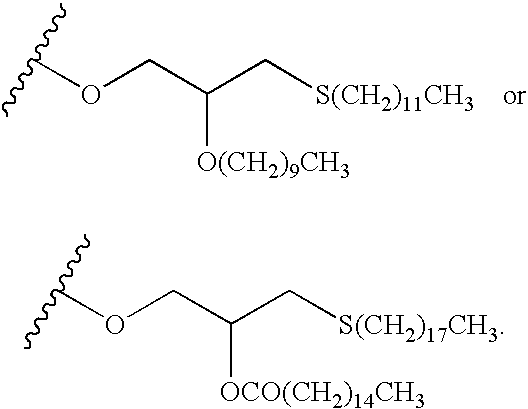Methods of inhibiting orthopoxvirus replication with nucleoside compounds
a technology of nucleoside compounds and inhibitors, which is applied in the direction of heterocyclic compound active ingredients, biocides, drug compositions, etc., can solve the problems of limited therapeutic utility of cidofovir, few compounds available as orthopoxvirus therapeutics, and the inability of most human populations to be immune to smallpox
- Summary
- Abstract
- Description
- Claims
- Application Information
AI Technical Summary
Benefits of technology
Problems solved by technology
Method used
Image
Examples
example 1
4-Amino-7-(2-C-methyl-β-D-arabinofuranosyl)-7H-pyrrolo[2,3-d]pyrimidine
[0169]
[0170]To chromium trioxide (1.57 g, 1.57 mmol) in dichloromethane (DCM) (10 mL) at 0° C. was added acetic anhydride (145 mg, 1.41 mmol) and then pyridine (245 mg, 3.10 mmol). The mixture was stirred for 15 min, then a solution of 7-[3,5-O-[1,1,3,3-tetrakis(1-methylethyl)-1,3-disiloxanediyl]-β-D-ribofuranosyl]-7H-pyrrolo[2,3-d]pyrimidin-4-amine [for preparation, see J. Am. Chem. Soc. 105: 4059 (1983)] (508 mg, 1.00 mmol) in DCM (3 mL) was added. The resulting solution was stirred for 2 h and then poured into ethyl acetate (10 mL), and subsequently filtered through silica gel using ethyl acetate as the eluent. The combined filtrates were evaporated in vacuo, taken up in diethyl ether / THF (1:1) (20 mL), cooled to −78° C. and methylmagnesium bromide (3M, in THF) (3.30 mL, 10 mmol) was added dropwise. The mixture was stirred at −78° C. for 10 min, then allowed to come to room temperature (rt) and quenched by add...
example 2
4-Amino-7-(2-C-methyl-β-D-ribofuranosyl)-7H-pyrrolo[2,3-d]pyrimidine
[0172]
Step A: 3,5-Bis-O-(2,4-dichlorophenylmethyl)-1-O-methyl-α-D-ribofuranose
[0173]A mixture of 2-O-acetyl-3,5-bis-O-(2,4-dichlorophenylmethyl)-1-O-methyl-α-D-ribofuranose [for preparation, see: Helv. Chim. Acta 78: 486 (1995)] (52.4 g, 0.10 mol) in methanolic K2CO3 (500 mL, saturated at room temperature) was stirred at room temperature for 45 min and then concentrated under reduced pressure. The oily residue was suspended in CH2Cl2 (500 mL), washed with water (300 mL+5×200 mL) and brine (200 mL), dried (Na2SO4), filtered, and concentrated to give the title compound (49.0 g) as colorless oil, which was used without further purification in Step B below.
[0174]1H NMR (DMSO-6): δ 3.28 (s, 3H, OCH3), 3.53 (d, 2H, J5,4=4.5 Hz, H-5a, H-5b), 3.72 (dd, 1H, J3,4=3.6 Hz, J3,2=6.6 Hz, H-3), 3.99 (ddd, 1H, J2,1=4.5 Hz, J2,OH-2=9.6 Hz, H-2), 4.07 (m, 1H, H-4), 4.50 (s, 2H, CH2Ph), 4.52, 4.60 (2d, 2H, Jgem=13.6 Hz, CH2Ph), 4.54 (...
example 3
4-Amino-7-(2-C-ethyl-β-D-ribofuranosyl-7H-pyrrolo[2,3-d]pyrimidine
[0185]
Step A: 3,5-Bis-O-(2,4-dichlorophenylmethyl)-2-C-ethyl-1-O-methyl-α-D-ribofuranose
[0186]To diethyl ether (300 mL) at −78° C. was slowly added EtMgBr (3.0 M, 16.6 mL) and then dropwise the compound from Step B of Example 2 (4.80 g, 10.0 mmol) in anhydrous Et2O (100 mL). The reaction mixture was stirred at −78° C. for 15 min, allowed to warm to −15° C. and stirred for another 2 h, and then poured into a stirred mixture of water (300 mL) and Et2O (600 mL). The organic phase was separated, dried (MgSO4), and evaporated in vacuo. The crude product was purified on silica gel using ethyl acetate / hexane (1:2) as eluent. Fractions containing the product were pooled and evaporated in vacuo to give the desired product (3.87 g) as a colorless oil.
Step B: 4-Chloro-7-[3,5-bis-O-(2,4-dichlorophenylmethyl)-2-C-ethyl-β-D-ribofuranosyl]-7H-pyrrolo[2,3-d]pyrimidine
[0187]To a solution of the compound from Step A (1.02 mg, 2.0 mmol)...
PUM
| Property | Measurement | Unit |
|---|---|---|
| temperature | aaaaa | aaaaa |
| temperature | aaaaa | aaaaa |
| temperature | aaaaa | aaaaa |
Abstract
Description
Claims
Application Information
 Login to View More
Login to View More - R&D Engineer
- R&D Manager
- IP Professional
- Industry Leading Data Capabilities
- Powerful AI technology
- Patent DNA Extraction
Browse by: Latest US Patents, China's latest patents, Technical Efficacy Thesaurus, Application Domain, Technology Topic, Popular Technical Reports.
© 2024 PatSnap. All rights reserved.Legal|Privacy policy|Modern Slavery Act Transparency Statement|Sitemap|About US| Contact US: help@patsnap.com










